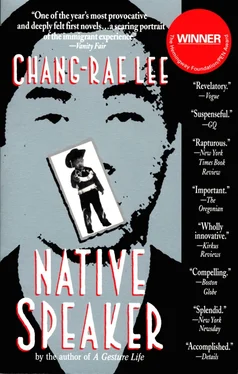“You knew the play, didn’t you, Jack?”
He shakes his head. “Dennis would never tell me that. He knows I would prefer not to lie to you.”
“You knew about Kwang and Eduardo.”
“I knew we were not responsible for the bombing. That was not us. I told you that from the start.”
“But the other matter.”
“Okay,” he says, not looking at me. “I did. But only after he was killed. I swear I did not know him. Dennis has other stations at his disposal, you know. He can bring in people when he wants. He was very angry that day of the bombing. Very angry. He let it slip. He wanted payback for his investment.”
“And I gave it to him.”
“It worked out that way, yes? Dennis put you in for your own sake. A refresher course. No one knew but him. Not even Eduardo. Each to his own world. But things changed, as they always do. You were in place. As Dennis says, in situ .”
“Eduardo was good,” I say, picturing him play-boxing with Kwang.
“He got caught,” Jack says. “Like you, he let himself get too close, but then he also got himself dead. In my book these are two big strikes against him.”
“So I have just one.”
Jack snorts. “You know, I would still take you on my team, Parky, any day of the week.”
He stops the car a block from the house. It’s early, but there are already people milling about in the street in front of the house. “Maybe you should go home, Parky. I will take you back home now. This is pointless. You owe him nothing.”
“Don’t tell me what I owe, Jack,” I say to him. “Don’t tell me anything like that.”
I get out and stand beside the car. His hands are heavy on the steering wheel.
“This must be the moment,” I say. “Now you get to retire.”
“Yes,” he answers. “So what will I do?”
“Garden,” I tell him. “You can work on the house.”
“But who will come up?”
I can’t answer him then. I don’t like seeing the picture of him, all sweaty and muddy, trudging into a silent house. His hands full of harvest, his kitchen shining and bright. But there’s no one to show the sauce tomatoes to, no one to smell his rosemary and sage. He takes his time, pulling the fragrant leaves. There. He will cook a beautiful meal tonight.
“You’ll be okay,” I say.
“That is right,” he says, weakly. “You are kind to let me drive you, Parky. You are a kind man.”
“I don’t mean to be.”
“What does it matter?” he says.
“Goodbye, Jack.”
“Henry,” he suddenly says, the sound of it strange. “Try hard to forget us. It can be done. Forget what you can.”
* * *
The crowd is growing loud again. Some of the people are arm in arm, drinking from beer bottles wrapped in small brown bags, not only men but women, too. If I were one of the people they were protesting, fresh off the boat, I would be sure I had just happened upon some community celebration, a festival of the culture.
Americans, one of them would say, are a wonderful and exuberant people. They dance, they play-fight, they puff up their lips and blow out their chests. They enjoy using their hands. They seem to live always at a football match. They stand in broken columns and flurry with both arms and both legs and they are not afraid to make a mess of themselves. They don’t so much sing as they do chant. Chanting is more satisfying, at least how they do it. Their calls first start all together and slow and then pick up speed and volume until they finally dissipate to separate voices and rounds of hand clapping and cheers. They slap hands in the air. Everyone leaps up and down. The sight is a most pleasing thing. They are every shape and color but they still share this talk, and this is the other tongue they have learned, this must be the special language.
We see flashing lights in the distance. Soon a line of six or seven squad cars turns the far corner and heads up the block toward us. The cars reach the edge of the throng and then slowly pull their way through the crowd, the lead car trying to move everyone to the sidewalks with sharp barks of its siren. It doesn’t work. People excitedly rush the vehicles, trying to see if he is inside one of them, checking all the back windows. From their motions you can tell he doesn’t seem to be there and this makes everyone even more anxious and edgy. People are beginning to shout at the squad cars, drum on the window glass and the trunks. The cars finally park and the cops angrily push their way out. There is some shoving, and finally they force people out of the way, using their nightsticks as blocking bars.
With all the commotion, I find I can get closer to the house, right up against the blue barricades that bar the short driveway. I notice that none of the officers manning them seems too concerned when the squad cars pull up, which tells me he probably isn’t with them. The extra cops are now aligning themselves along two yellow tapes they string in the form of a corridor that leads from the street to the house just past where I am.
The mass returns quickly, filling in the spaces on each side of the narrow cordon of police. I am hemmed in. The cameras are already pushing for the best angles, and the reporters are mostly ignoring the crowd, trying to get the officers to tell them what is going on; they complain that they need to know if they should be feeding live.
Two maroon four-doors somehow pull up without attracting much notice. Men in dark suits get out of the first one and then the doors of the other car open. Now other men exit, squinting in the light. They all look in this direction. Then one of them leans down and nods into the cab. Says something.
And then we see him. He steps from the car. In the distance of thirty yards, he looks small to me. Or maybe thinner. I half expect them to help him, but he pulls himself out, his hands free. He holds his suit jacket with one hand and shields his eyes with the other. He still has the bandage on his forehead, but the bruises around his left eye look almost healed.
They walk him up from the middle of the street. The people who are angry with him are hollering and pointing at him, stretching the police tape as far as they can. They scream at him like he is a child. They are calling him every ugly Asian name I have ever heard. A woman leans out and spits on his shoulder. Some others try to touch him but the plainclothesmen push them away.
I notice some others who are standing very still with their hands at their mouths. Most of these are Asian women. They look like the older women you see working in the alley behind a restaurant, pouring out buckets of dirty dishwater. They are tired, expressionless. But now they gaze at him as if he were their son, one maybe gone bad though now finally home, and the numbed speech on their faces seems to say how sad he must be and hurt enough and how he should be forgiven.
He is moving too slowly. He seems to tempt the mass. The men walking him try to speed him up, but he stays his pace. He shrugs them off. Now, he even stops. The people are screaming. An arm’s length away from him they shout with everything they have. But nothing registers in his face. It is as if he is deaf. He seems to look only at a window of his house, but I look up and no one is there.
He is already in another world.
But some part of him will taste this last crowd. He is willing to suffer their angry medicine. Perhaps he sees something meaningful, how this might be a test and a recompense. If you must walk the white-hot stones, touch each one.
I think that he wants to defy them, too, with this deliberation, each of his steps a careful word to break down the ready meter they have built, each halting a kind of instant deliverance.
The people seem to sense this, that there is some part of him they’re not getting to, not even touching, that he isn’t there for them. They start heaving forward on the other side of the path and snap the tape on their side.
Читать дальше












